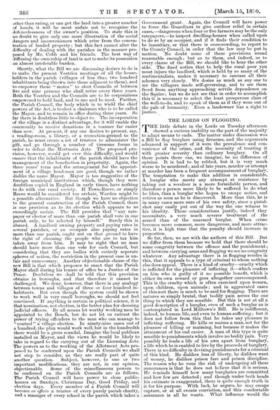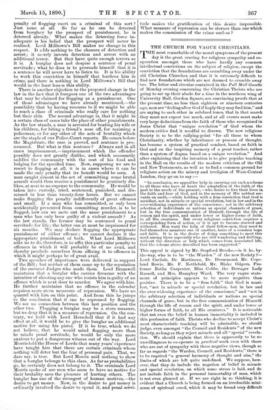THE LORDS ON FLOGGING. T HE little debate in the Lords
on Tuesday afternoon showed a curious inability on the part of the majority to adapt means to ends. The matter under discussion was a Bill to flog burglars using firearms, and the arguments advanced in support of it were the prevalence and con- venience of the crime, and the necessity of treating it with greater severity than ordinary burglary. On all these points there can, we imagine, be no difference of opinion. It is bad to be robbed, but it is very much worse to be murdered ; and of late years, murder or attempt at murder has been a frequent accompaniment of burglary. The temptation to make this addition is considerable. A burglar who meets any attempt at resistance by taking out a revolver is a more formidable person, and therefore a person more likely to be suffered to do what he likes, than a burglar who hopes to escape notice, and retires as soon as he is discovered. More than this, he is in many cases more sure of his own safety, since a pistol- shot may easily put out of the way the one witness to his identity. These considerations justify, indeed they necessitate, a very much severer treatment of the armed than of the unarmed burglar. When crime becomes more common, more dangerous, and more attrac- tive, it is high time that the penalty should increase in proportion. So far, then, we are with the authors of this Bill. But we differ from them because we hold that there should be some congruity between the offence and the punishment ; and between carrying arms and flogging we see no congruity whatever. Any advantage there is in flogging resides in this, that it appeals to a type of criminal to whom nothing else does appeal. There is a kind of cruelty—cruelty which is inflicted for the pleasure of inflicting it—which confers on him who is guilty of it no possible benefit, which is either its own reward or goes altogether unrecompensed. This is the cruelty which is often exercised upon women, upon children, upon animalsand in aggravated cases of this sort there is much to be; said for flogging. There are natures so simply brutal, that bodily pain seems the one thing to which they are sensible. But this is not at all a good description of a burglar, even of such a burglar as is contemplated in Lord Milltown's Bill. He is indifferent, indeed, to human life, and even to human suffering ; but it does not follow from this that he takes any pleasure in inflicting suffering. He kills or maims a man, not for the pleasure of killing or maiming, but because it makes the attainment of his end easier. A man of this type is quite sensible to punishments which involve no bodily pain. Very possibly he leads a life of his own apart from burglary, a life which he is enabled to live by the proceeds of burglary. There is no difficulty in devising punishments for a criminal of this kind. He dislikes loss of liberty, he dislikes want of money, he dislikes prison fare and prison discipline. The reason why he runs the risk of undergoing all these annoyances is that he does not believe that it is serious. He reminds himself how many burglaries are committed and how few are detected ; and though under both heads his estimate is exaggerated, there is quite enough truth in it for his purpose. With luck, he argues, he may escape capture, or at all events conviction, and this comfortable assurance is all he wants. What influence would the penalty of flogging exert on a criminal of this sort ? Just none at all. So far as he can be deterred from burglary by the prospect of punishment, he is deterred already. What makes the deterring force in- adequate is his belief that the prospect will never be realised. Lord Milltown's Bill makes no change in this respect. It adds nothing to the chances of detection and arrest; it merely invests detection and arrest with an additional terror. But they have quite enough terrors as it is. A burglar does not despise a sentence of penal servitude ; what he does is to persuade himself that it is a sentence he will never have to listen to. It is his ability to work this conviction in himself that hardens him in crime, and there is nothing in Lord Milltown's Bill that would in the least lessen this ability.
There is another objection to the proposed change in the law in the fact that it foregoes one of the two advantages that may be claimed for flogging as a punishment. One of those advantages we have already mentioned,—the possibility that by having recourse to it we might be able to reach a class of criminals who really care for nothing but their skin. The second advantage is, that it might in- a certain class of cases take the place of other punishments. As the law stands, a man is arrested for beating his wife or his children, for biting a friend's nose off, for maiming a policeman, or for any other of the acts of brutality which are the staple of our Police-Court reports. He comes before the Magistrate, the case is proved, and sentence is pro- nounced. But what is this sentence ? Always and in all cases imprisonment,—imprisonment which the offender possibly does not greatly dislike, and which necessarily saddles the community with the cost of his food and lodging for the specified time. Now, supposing we are to resort to flogging at all, it is in cases where it can be made the only penalty that its benefit would be seen. A man caught almost in the act of committing some brutal assault would thus receive a punishment he genuinely dis- likes, at next to no expense to the community. He would be taken into custody, tried, sentenced, punished, and dis- missed in less than twenty-four hours. But we cannot make flogging the penalty indifferently of great offences and small. If a man who has committed, or only been accidentally prevented from committing murder, is to be flogged, how can we mete out the same punishment to a man who has only been guilty of a violent assault ? As the law stands, the former may be sentenced to penal servitude for life ; the latter can at most be imprisoned for six months. We may declare flogging the appropriate punishment of either offence ; we cannot declare it the appropriate punishment of both. What Lord Milltown asks us to do, therefore, is to affix this particular penalty to offences in which it will probably be of no avail, and thereby preclude ourselves from affixing it to offences in which it might perhaps be of great avail.
Two speeches of importance were delivered in support of the Bill ; but neither of them came up to the reputation of the eminent Judges who made them. Lord Bramwell maintains that a burglar who carries firearms with the intention of shooting any one who resists him is guilty of an offence which is next door to murder. We agree with him. He further maintains that no offence in the calendar requires more stern measures of repression. We have no quarrel with him on this point. And from this he jumps to the conclusion that it can be repressed by flogging. We see no connection between this last position and the other two. Flogging a burglar may be a stern measure, but we deny that it is a measure of repression. On the con- trary, we hold with Lord Herschel that if it had any effect at all, it would be to give the burglar an additional motive for using his pistol. If it be true, which we do not believe, that he would mind flogging more than he minds penal servitude, he would be only the more anxious to put a dangerous witness out of the way. Lord Morris told the House of Lords that many years' experience have taught him that there are certain criminals whom nothing will deter but the fear of personal pain. That, we dare say, is true. But Lord Morris said nothing to show that a burglar belongs to this class. As far as probabilities go, he certainly does not belong to it. The criminals Lord Morris spoke of are men who seem to have no motive for their brutality save the pleasure of hurting others. The burglar has 'one of the strongest of human motives,—the desire to get money. Now, in the desire to get money is ordinarily involved the desire to spend it, and penal servi- tude makes the gratification of this desire impossible. What measure of repression can be sterner than one which makes the commission of the crime useless ?







































 Previous page
Previous page